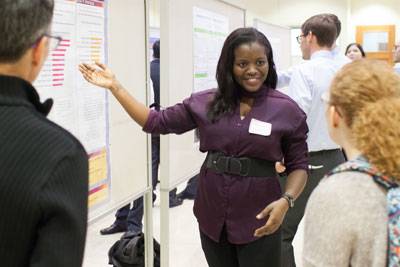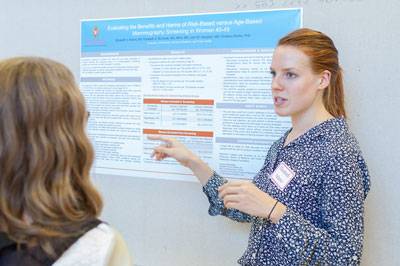MD Student Research Programs
Student research is a vital component of the educational mission of the University of Wisconsin School of Medicine and Public Health (SMPH). Students in the regular MD curriculum are encouraged to consider research as an integral part of their medical training and future careers.
Medical students have numerous opportunities to engage in mentored research through several school-sponsored programs and external programs offered by the National Institutes of Health, the Howard Hughes Medical Institute, and many others.
- Summer Research Programs
- Annual Medical Student Research Forum
- Path of Distinction in Research (class of 2020 and beyond)
- Research Honors Program (class of 2019 and earlier)
- Research travel awards
- Year-long fellowships
- Medical Scientist Training Program, for MD-PhD students
Summer Research Programs
The School of Medicine and Public Health’s cornerstone program is the Shapiro Summer Research Program, supported by a generous endowment from the Herman and Gwendolyn Shapiro Foundation. Approximately 100 SMPH medical students participate for eight to 10 weeks of research between their first and second year, mentored by faculty members in any of the school’s departments, centers or institutes. Visit our new Shapiro portal for detailed instructions for faculty, students and staff.
Research projects span a broad range of scientific investigation, including basic science, clinical, translational, health services, global health, public health, quality improvement and medical ethics. Students choose from a database of projects submitted by faculty or can independently find a mentor and project. Most projects do not require prior research experience. To enhance their summer research experience, students participate in research-skills training sessions, roundtable discussions, journal clubs and clinical shadowing.

The UW Department of Family Medicine and Community Health-sponsored Summer Research and Clinical Assistantship Program supports 10 medical students to conduct hands-on, clinically-oriented primary care research for eight weeks between their first and second year, mentored by department faculty. Students also participate in research training seminars, receive individualized support from faculty and present their findings at the end of the summer. The opportunity for clinical shadowing is a prominent feature of this program.
The UW Department of Surgery Summer Research Experience for medical students offers summer research experiences for eight medical students interested in research related to diabetes, obesity, endocrine disorders, nutritional disorders, digestive diseases, liver disease, kidney disease or urologic disease. Funded by a grant from the National Institute of Diabetes and Digestive and Kidney Diseases, the program provides students a mentored 10-12 week research experience. The program includes a curriculum designed to teach medical students the essentials of effective research principles.
Memorial Sloan Kettering Cancer Center offers a Medical Student Summer Research Fellowship, a 10-week National Cancer Institute-sponsored research program open to first- or second-year students at U.S. medical schools with a career interest in the field of oncology and/or related biomedical sciences. Additional funding is provided by Memorial Sloan Kettering’s Graduate Medical Education Office and the Office of Diversity Programs in Clinical Care, Research and Training.
Participants will:
- Gain clinical, translational or laboratory research experience
- Interact with Memorial Sloak Kettering physicians, PhD investigators, postdoctoral fellows and graduate students
- Attend a weekly lecture series presented by world-renowned Memorial Sloan Kettering faculty
- Present their summer research to fellowship peers and Memorial Sloak Kettering faculty during the final week of the program
- Receive a $5,800 stipend for participation in the program
Annual Medical Student Research Forum
The work of students who engage in medical and public health research between years one and two is showcased at the annual School of Medicine and Public Health Medical Student Research Forum. The forum features podium and poster presentations by students and a guest lecture by a faculty mentor.
The Research Forum takes place annually in November before Thanksgiving.
Path of Distinction in Research (Class of 2020 and Beyond)

Students in the MD curriculum who meet program standards may apply for the Path of Distinction (PoD) in Research. The PoD in Research grants graduation distinction to students who:
- Conduct a minimum of 16 weeks of mentored research during medical school, including summer research, research elective time or year-long research fellowships
- Contribute significantly to at least one manuscript or thesis based on original research
- Complete research-related learning and leadership activities
- Present scholarly work locally, and regionally or nationally
- Are in good standing
Find a complete description of Path of Distinction in Research and start an application.
Research Honors Program (Class of 2019 and Earlier)
Medical students in the MD curriculum who continue to conduct research throughout medical school and meet high academic standards may participate in the Research Honors program. The program grants a graduation with honors distinction to students who:
- Conduct a minimum of 16 weeks of mentored research during medical school
- Submit an approved first-author manuscript or thesis based on original research
- Complete a research skills competency training curriculum
- Present their work locally or nationally
- Maintain a minimum cumulative grade point average of 3.5
About five percent of each graduating class is awarded research honors. The program is overseen by the School of Medicine and Public Health Student Research Committee.
Research Travel Awards
Students are encouraged to present their research findings at professional meetings. Funding is available from the Dean’s Office and School of Medicine and Public Health departments to defray travel costs for students. More than 50 students are awarded support each year.
Year-Long Fellowships
Supported by the UW Institute for Clinical and Translational Research (ICTR) and the Herman and Gwendolyn Shapiro Foundation, the ICTR-Shapiro Medical Student Research Fellowship allows medical students the opportunity to engage in an intensive year-long research experience under the mentorship of a School of Medicine and Public Health faculty member. Typically, one fellowship award is made each March.
Medical students take a year out from their studies to participate in the fellowship, usually after Phase 2 of the ForWard Curriculum. Students are paid a stipend during their fellowship year and receive travel support to present their work at a professional meeting or conference. A unique aspect of the fellowship is a tuition allowance to complete six credits toward a Capstone Certificate in Fundamentals of Clinical Research or Clinical and Community Outcomes Research.
SMPH medical students can also take advantage of national and global year-long research fellowships offered by the National Institutes of Health (NIH), Howard Hughes Medical Institute, Doris Duke Charitable Foundation, Sarnoff Foundation, Centers for Disease Control and Prevention (CDC) and many other organizations.
Medical Scientist Training Program for MD-PhD Students
Our Medical Scientist Training Program (MSTP) provides integrated graduate training in scientific research and clinical medicine, leading to a combined MD-PhD degree. The program has a steady average acceptance and graduation rate of 10 students per year and total program size of about 80.
MD-PhD students are guaranteed funding throughout their training, which includes tuition and an annual stipend. MSTP alumni become faculty in academic medicine, leaders of industry, public servants in government and innovative entrepreneurs.
Students traditionally apply to the MD-PhD program when applying to medical school. However, candidates may also apply during their first two years of medical school at the UW School of Medicine and Public Health. Shapiro fellows who wish to pursue research training beyond the one-year fellowship are also encouraged to apply.
For more information, contact mstp@med.wisc.edu.